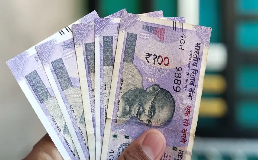The Indian rupee plunged to a new low of 84.50 against the US dollar on November 22, driven by the dollar’s steady appreciation, consistent FPI (foreign portfolio investors) selling, and rising geopolitical tensions. This month, the US Dollar Index has risen 3.10%, approaching a two-year-high, as it measures the dollar’s value against six major currencies.
The US dollar has been gaining strength due to market expectations that President-elect Donald Trump’s policies may lead to higher inflation and decrease the likelihood of future interest rate cuts in the US. Strong US economic indicators and Federal Reserve officials’ comments suggesting no rush to cut interest rates are also fuelling this upward trend.
The US dollar soared to a 52-week high of 107.18 this week, marking a significant surge of over 3.70% since Donald Trump’s presidential victory on November 5. The continued outflow of funds by Foreign Portfolio Investors (FPIs) from Indian equities and bonds has added to the downward pressure on the rupee.
Reasons Behind The Decline Of Indian Rupee
As of now, foreign investors have pulled out a significant Rs 22,420 crore from Indian equities this November. In October 2024, foreign investors withdrew a massive Rs 94,017 crore from Indian stock markets. Russia launched a missile attack on Ukraine’s Dnipro city on Thursday, reportedly in retaliation for the US and UK’s approval of Kyiv’s use of advanced Western arms against Russian territory.
Additionally, investor sentiment has been impacted by concerns over high valuations, disappointing Q2FY25 earnings, and predictions of a slowdown in India’s GDP growth during the same quarter.
Amid these uncertainties, the rupee has plummeted around 0.5% this November, despite the Reserve Bank of India’s (RBI) regular interventions, including one on Friday, which have helped mitigate the decline.
It is worth noting that SBI research predicts that the rupee may drop in value by 8-10% against the US dollar during Donald Trump’s second presidency.



